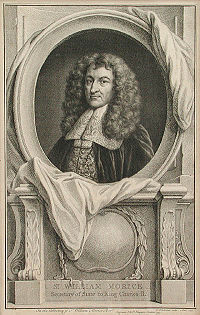.gif)
William Morice (Secretary of State)
Encyclopedia

Secretary of State for the Northern Department
The Secretary of State for the Northern Department was a position in the Cabinet of the government of Great Britain up to 1782. Before the Act of Union, 1707, the Secretary of State's responsibilities were in relation to the English government, not the British. Even after the Union, there was...
and a Lord of the Treasury
Lord of the Treasury
In the United Kingdom, there are at least six Lords of the Treasury who serve concurrently. Traditionally, this board consists of the First Lord of the Treasury, the Second Lord of the Treasury, and four or more junior lords .Strictly they are commissioners for exercising the office of Lord...
from June 1660 to September 1668.
Morice was educated at Exeter College, Oxford
Exeter College, Oxford
Exeter College is one of the constituent colleges of the University of Oxford in England and the fourth oldest college of the University. The main entrance is on the east side of Turl Street...
. He was elected Member of Parliament
Member of Parliament
A Member of Parliament is a representative of the voters to a :parliament. In many countries with bicameral parliaments, the term applies specifically to members of the lower house, as upper houses often have a different title, such as senate, and thus also have different titles for its members,...
for Devon
Devon (UK Parliament constituency)
Devon was a parliamentary constituency covering the county of Devon in England. It was represented by two Knights of the Shire, in the House of Commons of England until 1707, then of the House of Commons of Great Britain from 1707 to 1800 and finally the House of Commons of the United Kingdom from...
to fill a vacancy in 1648, but was excluded in Pride's Purge
Pride's Purge
Pride’s Purge is an event in December 1648, during the Second English Civil War, when troops under the command of Colonel Thomas Pride forcibly removed from the Long Parliament all those who were not supporters of the Grandees in the New Model Army and the Independents...
in December of that year, probably before he had taken his seat. Nevertheless, he was appointed High Sheriff of Devon
High Sheriff of Devon
The High Sheriff of Devon is the Queen's representative for the County of Devon, a territory known as his bailiwick. Selected from three nominated people, he holds his office over the duration of a year. He has judicial, ceremonial and administrative functions and executes High Court...
in 1651, and returned to Parliament as MP for Devon in the First Protectorate Parliament
First Protectorate Parliament
The First Protectorate Parliament was summoned by the Lord Protector Oliver Cromwell under the terms of the Instrument of Government. It sat for one term from 3 September 1654 until 22 January 1655 with William Lenthall as the Speaker of the House....
elected in 1654. He subsequently represented Devon again in the Second Protectorate Parliament
Second Protectorate Parliament
The Second Protectorate Parliament in England sat for two sessions from 17 September 1656 until 4 February 1658, with Thomas Widdrington as the Speaker of the House of Commons...
, Newport (Cornwall)
Newport (Cornwall) (UK Parliament constituency)
Newport was a rotten borough situated in Cornwall. It is now within the town of Launceston, which was itself also a parliamentary borough at the same period...
in the Third Protectorate Parliament
Third Protectorate Parliament
The Third Protectorate Parliament sat for one session, from 27 January 1659 until 22 April 1659, with Chaloner Chute and Thomas Bampfylde as the Speakers of the House of Commons...
.
A relation of General Monck
George Monck, 1st Duke of Albemarle
George Monck, 1st Duke of Albemarle, KG was an English soldier and politician and a key figure in the restoration of Charles II.-Early life and career:...
, Morice assisted in the Restoration
English Restoration
The Restoration of the English monarchy began in 1660 when the English, Scottish and Irish monarchies were all restored under Charles II after the Interregnum that followed the Wars of the Three Kingdoms...
and was knighted in 1660. He was also made a Privy Counsellor and appointed Secretary of State for the Northern Department
Secretary of State for the Northern Department
The Secretary of State for the Northern Department was a position in the Cabinet of the government of Great Britain up to 1782. Before the Act of Union, 1707, the Secretary of State's responsibilities were in relation to the English government, not the British. Even after the Union, there was...
, an office he held until he resigned in 1668; he was apparently an undistinguished minister, but justified his tenure of office by his usefulness in the House of Commons. In the Convention Parliament of 1660 he was re-elected for Newport but was also elected for Plymouth
Plymouth (UK Parliament constituency)
Plymouth was a parliamentary borough in Devon, which elected two Members of Parliament to the House of Commons in 1298 and again from 1442 until 1918, when the borough was merged with the neighbouring Devonport and the combined area divided into three single-member constituencies.-In the...
, which he chose to represent, and was that city's MP until his death 16 years later.
In 1657, during the Commonwealth, he published a treatise on the administration of the sacrament
Eucharist
The Eucharist , also called Holy Communion, the Sacrament of the Altar, the Blessed Sacrament, the Lord's Supper, and other names, is a Christian sacrament or ordinance...
to all church members.
Morice married Elizabeth Prideaux, and they had a number of children. His eldest son, William (c. 1628-1690), was created a baronet in 1661, and was later also a member of Parliament.

